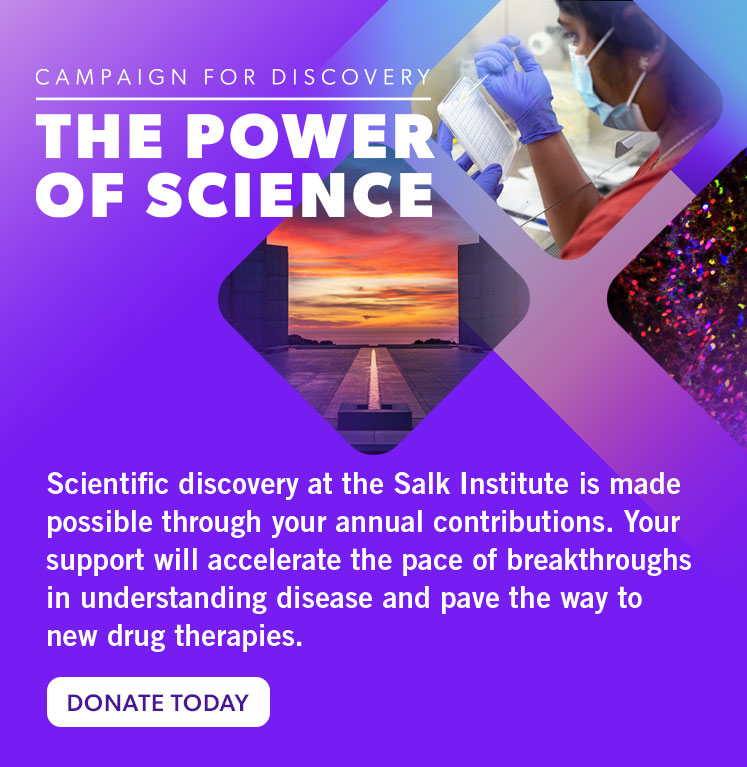Gratitude Professor or partner? Luc Jansen’s switch from science to law
When Luc Jansen didn’t get into medical school on the first try, he enrolled in a biology master’s program. In the Netherlands, where Jansen grew up, only half of the applicants in the country could enroll in medical school each year based on a random lottery. He figured that, since biology and medicine had overlapping curricula, a year of biology wouldn’t set him too far behind his peers if he transferred into medicine a year later.
But another year came and went, and Jansen was still studying biology. Unsure what career outcomes looked like with a biology degree, he took up a second academic track: law. For Jansen, simultaneously completing two master’s degrees—one in biology and another in law—meant he would have to make a difficult career decision in the near future.
“I was actively deciding what career path to take when I came to Salk in 2003,” recalls Jansen. “I wound up at the Institute through a series of connections—I knew a Dutch professor in New York City, who knew Jan Karlseder was at Salk doing his postdoctoral research, who suggested I join the lab of Andrew Dillin, an assistant professor at the time.”
Jansen got the chance to work alongside Dillin for six months. One day, Jansen took a risk and asked Dillin to connect him with Salk’s legal office to get their perspective on other career trajectories. While this could have been received as noncommittal or even rude, Dillin enthusiastically pushed Jansen to explore the option—a memory that has stuck with Jansen for 20 years as a reflection of the encouraging and collaborative nature of Salk scientists.
As his time at Salk came to an end, Jansen felt warmly about his experiences and the people he had met—but he still had another career track to try out, so he rotated in a law office next.
When he thought about a future in academia, Jansen contemplated funding insecurity and the potential need to relocate based on available academic opportunities. When he thought about a future in law, he saw stability and a more controllable trajectory. So he officially committed to law. “Though if someone had offered me a full professorship at Salk in that moment, I would have certainly taken that road instead,” Jansen says with a laugh.
After finishing his biology and law degrees in the Netherlands, Jansen went to Columbia University to complete law school. He attempted to hold on to some of his scientific background by studying patent law, hopeful that he could work in biotechnology helping scientists license their discoveries. But he eventually switched to corporate law.
“I’m doing private equity fund formation now, which generally has nothing to do with science,” says Jansen. “But thinking outside of the box, finding new ways to do things, collaborating with others—these are all scientific skills that are translatable to the legal field. And now I have unique legal skills that can help me give back to Salk and support the incredibly impressive scientists and research happening there.”
Two years ago, Jansen transferred to McDermott Will & Emery LLP as a partner in its corporate group. Despite the many twists and turns along his path to “Big Law,” Jansen is happy with where he landed in the end. His office at One Vanderbilt is a landmark in New York City, which he is excited to share with Salk faculty after recently reconnecting with some familiar faces.
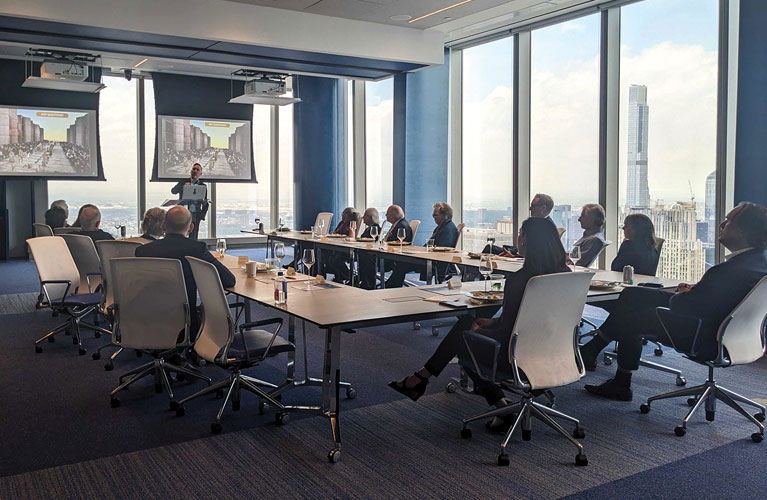
“Thinking outside of the box, finding new ways to do things, collaborating with others—these are all scientific skills that are translatable to the legal field.”
–Luc Jansen
In April 2024, Jansen helped host what he hopes to be the first in a series of Salk events in New York. Surrounded by a view of the city’s skyscrapers, Professor Reuben Shaw shared his science with an East Coast audience. Jansen’s colleagues learned about genetics and cell metabolism and how studying these fundamental processes can help us one day treat or prevent diseases like cancer and diabetes.
Events like this help the Institute connect with leaders in different cities and industries and inform them about the importance of continued investment in basic research, which explores the fundamental principles of life. Jansen personally loves the challenge of communicating how exciting and life-changing basic biology research can be and hopes that this will translate into donations and collaborations with Salk in the future.
“I love Salk science because it’s basic,” says Jansen. “Basic science touches everything—if your findings are fundamental enough, everything connects. Everything has translational potential.”
Featured Stories
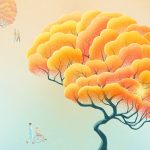 Getting to the root of Alzheimer’sSalk scientists are teaming up to understand brain aging. By collaborating across disciplines like genetics, neuroscience, and immunology, our researchers are uniquely positioned to lead us into a future of healthier aging and effective therapeutics for Alzheimer’s.
Getting to the root of Alzheimer’sSalk scientists are teaming up to understand brain aging. By collaborating across disciplines like genetics, neuroscience, and immunology, our researchers are uniquely positioned to lead us into a future of healthier aging and effective therapeutics for Alzheimer’s.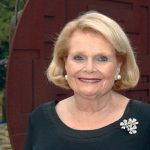 Salk mourns the loss of Joan JacobsThe Salk Institute lost one of its greatest supporters and one of San Diego’s most generous philanthropists when Joan Jacobs died on May 6, 2024, in La Jolla, California. She was 91 years old.
Salk mourns the loss of Joan JacobsThe Salk Institute lost one of its greatest supporters and one of San Diego’s most generous philanthropists when Joan Jacobs died on May 6, 2024, in La Jolla, California. She was 91 years old.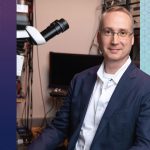 Axel Nimmerjahn— Widening perspectives through plane windows and microscope lensesInside Salk sat down with Nimmerjahn to hear how he went from curious child to world renowned researcher. Now a professor at Salk, he studies the central nervous system and designs new tools—like mini microscopes!—to study the system's various cell types.
Axel Nimmerjahn— Widening perspectives through plane windows and microscope lensesInside Salk sat down with Nimmerjahn to hear how he went from curious child to world renowned researcher. Now a professor at Salk, he studies the central nervous system and designs new tools—like mini microscopes!—to study the system's various cell types.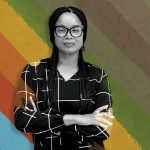 Jálin Johnson— Enhancing equity and inclusion at Salk and beyondOver the course of nearly 30 years dedicated to advocacy work, Jálin B. Johnson has served those in need and has given a voice to the voiceless—a principle that has guided her throughout her career. This commitment continues to shape her work as she steps into the role of director of Salk’s Office of Equity & Inclusion.
Jálin Johnson— Enhancing equity and inclusion at Salk and beyondOver the course of nearly 30 years dedicated to advocacy work, Jálin B. Johnson has served those in need and has given a voice to the voiceless—a principle that has guided her throughout her career. This commitment continues to shape her work as she steps into the role of director of Salk’s Office of Equity & Inclusion.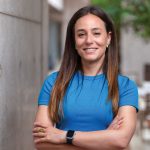 Lara Labarta-Bajo—An immunologist’s journey from Barcelona and ballet to the brainWhether dancing in Spain or surfing in San Diego, Lara Labarta-Bajo has always celebrated the power of the human body. Now a postdoctoral researcher in Associate Professor Nicola Allen’s lab at Salk, she studies how the immune system connects the body to the brain and how this relationship evolves as we age.
Lara Labarta-Bajo—An immunologist’s journey from Barcelona and ballet to the brainWhether dancing in Spain or surfing in San Diego, Lara Labarta-Bajo has always celebrated the power of the human body. Now a postdoctoral researcher in Associate Professor Nicola Allen’s lab at Salk, she studies how the immune system connects the body to the brain and how this relationship evolves as we age. Professor or partner? Luc Jansen’s switch from science to lawDashed dreams of medical school brought Jansen to Salk's campus back in 2003, where he simultaneously contemplated a career in scientific research and a career in big law. Though he decided on law in the end, Jansen's affection for Salk remains as he now hosts Salk gatherings in his New York City office and excitedly shares the enduring importance of basic science.
Professor or partner? Luc Jansen’s switch from science to lawDashed dreams of medical school brought Jansen to Salk's campus back in 2003, where he simultaneously contemplated a career in scientific research and a career in big law. Though he decided on law in the end, Jansen's affection for Salk remains as he now hosts Salk gatherings in his New York City office and excitedly shares the enduring importance of basic science.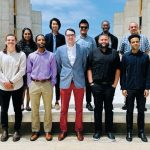 Rising Stars and DISCOVER programs provide new opportunities for trainees from underserved backgroundsThe Salk Institute recently hosted two inaugural events designed to enhance diversity within the scientific community: the Rising Stars Symposium and the Diverse Inclusive Scientific Community Offering a Vision for an Ecosystem Reimagined (DISCOVER) Symposium.
Rising Stars and DISCOVER programs provide new opportunities for trainees from underserved backgroundsThe Salk Institute recently hosted two inaugural events designed to enhance diversity within the scientific community: the Rising Stars Symposium and the Diverse Inclusive Scientific Community Offering a Vision for an Ecosystem Reimagined (DISCOVER) Symposium.






















































